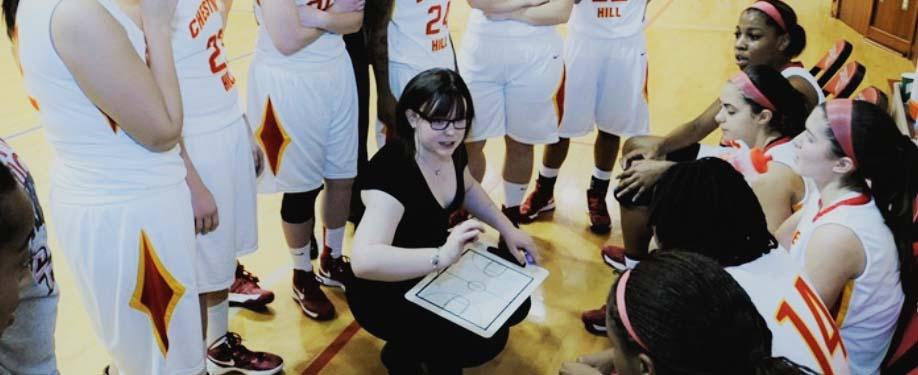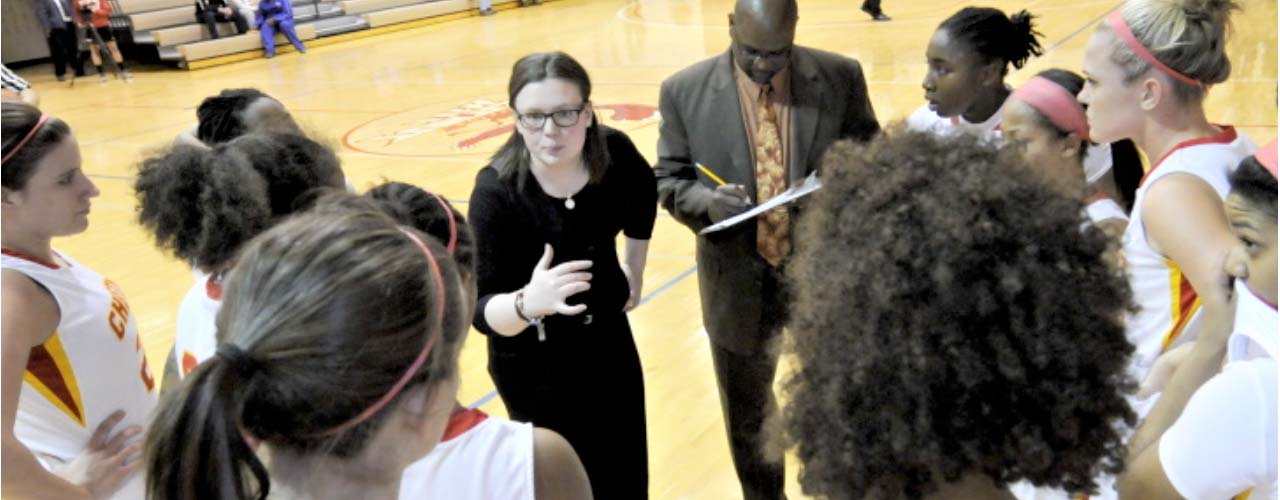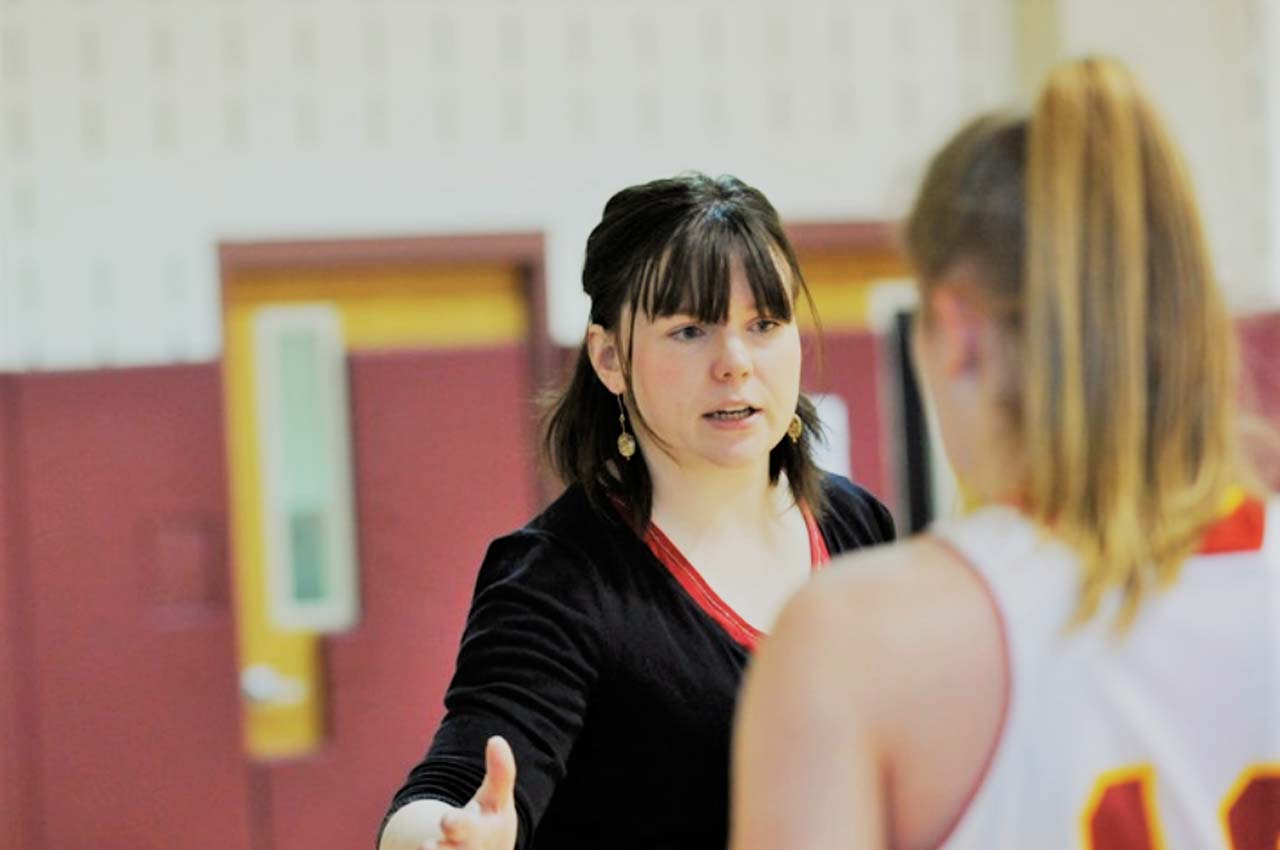Laura Mullaly - Liffey Celtics BC

Head Coach: Liffey Celtics
Interview
Can you take us through your playing background?
Basketball was an integral part of my family, so it was a natural progression to start playing around the age of 12. There were limited options in the early 90's in Athlone when it came to underage club basketball, so my playing career was essentially school basketball and playing with Midlands teams, which I was selected for both the U15/U18 age groups. I did travel to the USA in transition year student exchange and played high school basketball and experienced AAU basketball (Club) for a year. That was when it fully landed with me that I wanted to experience college basketball once I completed my Leaving cert. It was a real eye opener once I understood how immersed basketball players were at my age in the USA, I mean we are talking anywhere from 45-65 games in a spring/summer season of club basketball (excluding high school - which is an additional 15-20 games) depending on your schedule. I knew I had to find a way to play more competitive games if I wanted to make a scholarship a reality, so in 5th and 6th year I joined Killester Basketball club U17/U18/U19.
I was never selected to play internationally but gained enough exposure during my year on a student exchange to be recruited by a couple of institutions in the USA and finally settled on a Division II school on Long Island in New York, where I played college basketball for four years in the USA at Dowling College on Long Island (2001-2005).
How did you get involved in coaching?
I was involved in coaching skill development and local camps in Athlone during my time in secondary school - but to be completely honest with you, I never viewed coaching as something that could be a career. That was simply not my experience of the sport in Ireland up to that point.
Coaches were so committed, invested and knowledgeable, but they all had careers in something other than hoops, so I suppose in my limited life experience I perceived coaching back then as a part time hobby. Of course, now I can look back and roll my eyes at myself, I fully understand the time commitment of preparing for a season at any level, there is no such thing as a part time coaching.
After graduating in 2005 from college, I was offered a Graduate Assistant Coach position at Dowling College, so while I studied for my Master's degree in Education at Dowling College, I essentially began my coaching career, which was the start of 15 years on the side lines.
Various camps and clinics in Athlone up to the age of 18
What kind of teams have you coached?
AAU Coach with the Silver Bullets AAU team, Long Island NY - Girls U11 - 2001-2004
Graduate Assistant, Dowling College (Division II), 2005-2007
First Assistant Coach, Dowling College, 2007-2009
Associate Head Coach, Dowling College, 2009-2011
Head Women's Basketball Coach, Chestnut Hill College (Division II), 2011-2015
Director of Athletics and Head Women's Basketball Coach, CMSV (Division III), 2015-2017
Head Coach, Liffey Celtics, 2019-2020
Who would you say was a role model for you as a coach and why?
So many! Firstly, my dad - Paddy Mullally - has committed his whole life to teaching and coaching. What's most impressive is his commitment to being a consummate student of the game. He is always studying/reading/learning, even after decades of coaching. I really learn from him the value in being open to new ideas, accepting that you don't always have all the answers and of course accepting the game and how it evolves. As coaches and individuals, we have to evolve too and so besides his incredible wealth of knowledge that has been shared with me, the inspiration to be a continuous student of basketball and life makes him first on the list.
Next is Joe Pellicane - my college coach for two years, who then returned to Dowling College after a stint at St.John's University (Division I) - and whom I spent all my years on the sideline as his assistant. Joe really instilled in two things - firstly the importance of team unity and establishing relationships with athletes. It's easy to be "in" and committed to the team when you are winning, but when you hit those bumps in the road, making sure players stay committed and loyal to themselves, each other and the staff requires having established strong relationships, it takes time and constant effort but I do think it is key to long term success. Secondly, the importance of preparation - having a plan and knowing the opponent better than they know themselves, we watched a lot of game tape.
Finally, Eamon Molly, while my time with Killester was brief - two seasons, Eamon's basketball IQ and ability to read a game offered me a new perspective on how to tune in to the flow of a game. I experienced Eamon as very instinctive when he coached. As coaches, we all have expectations for our team on game day, but Eamon was a great example of how important expectations are but to be rooted in the reality of what is happening in the moment. Things don't always go according to plan - so you have to be ready to make the calls and really trust your gut in the moment!

What is the most important thing for you when coaching younger/teenage boys and girls?
Coaching younger boys and girls, always needs to be fun, but in addition to that it's really important that they are kept moving and engaged, they need to know how to do something but also why they are doing it. Skill development is paramount but so is basketball IQ, this way they can really tap into their own instincts as a player.
Have you any tips you'd like to share on keeping girls engaged in sport - particularly at the 14-18 year old age group?
Well it's a really challenging age group to keep engaged, especially in Ireland - having been in the USA for so long, this isn’t a question that would come up because from a basketball perspective, this age is simply the single more most vital time to be engaged if you want to play at the collegiate level. College coaches are under increasing rules and regulations by the NCAA and can only go to watch athletes play at certain times of the year or at the Division I level, are only permitted a certain number of days per year to recruit, so in order to receive an opportunity to play college basketball kids in this age group must be fully committed all year round - so there is major no incentive.
While we have international/academy opportunities that are super competitive, I think the real question is how to keep the majority of players, who make up the bulk of the team numbers engaged.
But two things that come to mind is first, the importance of female role models not just as coaches but in all aspects of the game, referees, administrative responsibilities, table officials etc. Young girls have to be able to see that they can do it all - you can be a committed athlete, you can focus on studies, you can have fun times with friends, you can spend time with your family and experience life in the appropriate ways - while still playing or being part of the game you love.
Secondly, I think it is vitally important for coaches to remember, for all young players the ball is going to stop bouncing eventually, so the question becomes how do we prepare them through basketball, for life?
I think there needs to be a shift in the paradigm of “winning” - to win games is great, but to teach players to be winners, is paramount. So as coaches, emphasizing creating bonds with team mates, learning how to graciously accept failure, respect for others, acceptance of differences of opinions, conflict management, mindfulness for being in the moment - all these life lessons (which can be made relevant to the level you are coaching) makes the overall experience valuable, regardless of court time.
I think when players know you are genuinely interested in their wellbeing and success in all aspects of life, then it becomes incredibly empowering for young girls to feel they can embrace their own journey and create their own “basketball” success story, regardless of how many minutes they play in a game.
Do you have a favourite drill you use for younger players to keep them engaged in the training session and if so, what is it?
Well I am a big advocate of drills being game like, so two things I drill in every practice are transition - so two way drills that work on going from offense to defence and vice versa - and passing drills. I think passing is a lost art of the game and great teams take care of the ball, share the basketball and deliver the basketball on time and on target, but there needs to be pressure (time/goal/defenders) in order for it to be preparing for games.
Have you tips you would like to give to young coaches who are starting out?
Firstly, coach the team in front of you, honestly evaluate your players and their abilities. You may love to play up-tempo and score a lot of points, but if you don't have the personnel for that then you need to make adjustments. You must meet your players/teams where they are, as you work to where you would like to be - don’t be afraid of change.
Secondly, don’t take things personally. Depending on the level you are coaching at, you are going to have to have difficult conversations and make difficult decisions. You probably won’t be “liked” by all your players (their parents), but the goal should be to earn their respect through your humility, dedication and hard work. You have to be patient, it takes time, but you have to believe in your unique talent to share the information and knowledge you possess. There is no one way to coach the game.
What is the most valuable lesson you have learned as a player?
Firstly, the problem is not usually the problem, the problem is how you respond to the problem. Failing is inevitable, so no need for a pity party or a major guilt trip when you make a mistake, but responding the right way allows every experience you perceive as negative can be turned into a positive, you can learn from it and use it as a catalyst for improvement.
Secondly, be a great teammate - you can’t be successful without the help from others.
What is the most valuable lesson you have learned as a coach?
Impeccable doesn’t have to mean perfect - being impeccable means how you think, how you speak and how you act need to align. It’s being authentic, being honest and showing up for your team, every practice and every game and coaching from a space of love, not demanding out of fear. When you make the wrong call, acknowledge it and move on, there is only so much you have control over. Strive to be a coach, you would trust and love to have your (future) son/daughter play for.
Have you noticed many changes in Ireland in coaching over the years? If so, what?
Well I have been away for almost 20 years so I have limited knowledge as it pertains specifically to coaching, but what I can say there is a great shift in basketball overall. I think the numbers have massively increased, the popularity of the game has grown and while some of the faces are the same on the sidelines, I think the level of play overall has increased exponentially and it is super exciting to see and be a part of.

Where would you like to see coaching basketball in Ireland move/change to?
What a great question! I suppose just a continued commitment to educating all coaches, a continued sharing of knowledge through speaking engagements, on court demonstrations, online chats etc.
I would also love to see the shared knowledge of ways to assist in both coaches and players developing more positive feelings of success, that success and worth aren’t just based on an outcome. I practice as an acupuncturist and the supporting research on the very real and very important mind-body connection can’t be denied, I think it would be amazing (not only for basketball success) but improved quality of life to incorporate mediation, mindfulness and acupuncture as an integral part of the education for wellbeing as coaches and athletes.
How do you measure the success of a training session?
Every session is different, players are different each session, coaches are different - how could we not be, days pass, life experiences happen in the time between practices - so success can be measured in many ways. Generally speaking, if there is good energy, great communication and players coaching/motivating players then I always consider that a victory.
How do you measure success in broader terms? (eg winning Cups, seeing players develop)
Well I think at the Superleague level, every team’s goal is to win the league and the cup - but for me, success doesn’t only get validated from the win/loss record - don’t get me wrong, I love the feeling of winning a game, but from my personal experience the feelings that come from it are temporary and transitory at best.
So, a broader measure of success for me, is the level of “buy in” by the team - it's not a very tangible thing to measure, it simply comes from experience and instinct. You know when a team is playing for you and for each other, without personal agendas. If you have personal agendas, then essentially you end up coaching effort and that is a one way ticket to burn out. So when I reflect on a season, the true feeling of success is asking did we cross that threshold of “we” vs “me” mindset, if we did that is winning basketball and a feeling that stays with you for a long time.
When you first stepped up to National League/International level, were you nervous/anxious about the step up and how did you deal with that if so?
I was really honoured and excited to be part of the Super league this year - as a woman to coach women at the highest level was an exciting challenge. I feel secure in what I have to offer as a coach, so the winning and losing wasn’t going to shift my self-worth or affect my work ethic. I did have to watch a great deal of game tape, talk to coaches and referees about FIBA rules, rely on an amazing and loyal assistant coach and just stay open to what the experience was going to bring.
I would absolutely love to coach at the International Level, that is definitely a personal goal and challenge I would eagerly embrace.
How important do you think it is for coaches to keep learning and developing regardless of level of experience?
In my experience it is the single most important part of the profession - humility and having a beginner's mind keeps things fresh! None of us have all the answers, accepting there is always a new perspective to gain from other coaches at all levels (in all sports) AND from your players, they will teach you just as much as you will them. It is what stops the profession from getting boring from one season to the next.
What would you say to other female coaches who are considering moving up a level in their coaching careers? Eg: From club level up to National League, from National League level up to Academy/International.
DO IT! What have you got to lose? You don’t need to have all the answers - so much is learned as you go, but stay humble and hustle hard, have great work ethic and a good moral compass and the number of games you win will pale in comparison to the number of lives you positively impact.
Anything else you'd like to add?
To all the coaches involved in the game you are so appreciated, particularly to the majority who volunteer.
To all the players, don't compare yourself to others, work every day to be the best version of yourself and the right doors will open for you.

